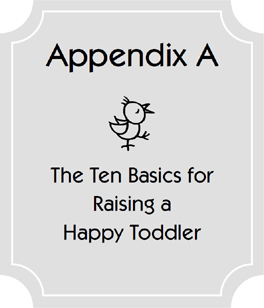1. It helps to think of your toddler as a little caveman.
With all their grunting and grabbing, toddlers can act uncivilized. In fact, their brains are actually pretty primitive and out of balance. The part that’s good at language and logic is immature, and the part that’s emotional and impulsive is in the driver’s seat. Even our brains lose much of their language and logic ability when we’re upset (we get so mad we “go ape!”). But since toddlers are primitive to start with, when they’re upset their brains get so stressed-out they seem to go … prehistoric!
2. Know your toddler’s temperament.
Is your child laid-back? Cautious? Spirited? Knowing your toddler’s temperament will help you be better at anticipating his needs and reactions so you can be a better parent.
3. Give yourself a pat on the back.
Parenting is hard. Parenting is a challenging job. Besides having to handle your primitive little pal’s ups and downs, you’ll regularly have to struggle with these common parenting problems:
• You don’t have enough help: If you’re like most parents today, you don’t have the rich network of family and friends that parents throughout history have relied on to help them at home. And at the same time, you may be struggling with a modern challenge that past generations rarely encountered: Dads and Moms having to leave the home to hold down full-time jobs.
• You feel like a flop: Most new parents have no training and little experience. No wonder we feel demoralized when our little Bamm-Bamms do the normal things that all toddlers do: have meltdowns, act unreasonably, and challenge the rules.
• Your buttons get pushed: Don’t be surprised if your toddler’s spitting and shrieks unexpectedly awaken within you painful memories or upsetting feelings from deep in your past.
• You have a personality mismatch: Does your personality clash with your little one’s? If so, take a breath, count your blessings, and focus on what you love about your child.
4. Be an ambassador to your uncivilized little tot.
Once you realize your toddler is uncivilized (especially when she’s mad), it becomes clear why parenting is so tricky. Most successful moms and dads handle their toddler’s upsets with a mix of respect, kindness, and diplomatic limit setting. In other words, you’ll be the most successful if you think of yourself not as your child’s “boss” or “buddy,” but as a skillful ambassador from the 21st century to your primitive little friend.
5. Practice the Fast-Food Rule every day.
Upset toddlers often get so frantic they seem deaf to our calm words of explanation and reason. That’s why, when your tot is tantrumming, it’s imperative that you spend a minute echoing what you think she wants and feels—to help her settle down a bit—before taking a turn to tell her your important message.
6. Speak in your upset toddler’s native lingo—Toddler-ese.
Toddlers aren’t that good with language to begin with, and when they’re upset, their stressed-out brains struggle with our words even more. That’s why when your child is emotional—mad, sad, scared, etc.—she’ll understand you the best if you translate your statements into a simpler style of language, Toddler-ese. It’s as easy as one-two-three:
1) Use short phrases.
2) Repeat the phrases several times.
3) Use animated gestures and an expressive tone of voice to mirror a bit of your child’s feeling. That allows you to connect with her emotional sweet spot.
7. Encourage your child’s good (green-light) behavior with lots of fun interactions like:
• Time-ins: Lavish your child with tiny bits of attention, play, praise, gossip, hand checks, et cetera, at least twenty times a day.
• Confidence builders: Make your child feel like a winner by offering choices and playing the boob whenever you can.
• Teaching patience: Increase your child’s control over her outbursts by practicing patience-stretching and magic breathing.
• Routines: Create fun routines like bedtime sweet talk and special time to help your tot feel smart, happy, and loved.
• Planting seeds of kindness: Teach your child how to be kind and considerate by means of:
1) fairy tales, 2) catching others being good,
3) role-playing.
8. Curb your child’s annoying (yellow-light) behaviors.
All toddlers dawdle, whine, and defy, but you can curb these annoyances by connecting with respect (a combination of the Fast-Food Rule +Toddler-ese), by offering win-win compromises to encourage better behavior, and by giving mild consequences (like clap-growl or kind ignoring) when the nuisance continues.
9. Put a quick halt to your child’s unacceptable (red-light) behaviors.
When your child is aggressive, doing something dangerous, or breaking a key family rule, it’s time for you to stop the situation fast with a “take-charge” consequence (time-out or giving a fine).
10. Prevent most tantrums or lovingly stop them in their tracks.
You can stop half of your toddler’s tantrums in seconds just by using the Fast-Food Rule +Toddler-ese. And, even more amazingly, you can prevent 50 to 90 percent of toddler outbursts from ever happening by: avoiding problem situations, connecting with respect all day long, feeding the meter (with frequent time-ins, playing the boob, routines, etc.), and teaching patience-stretching.
